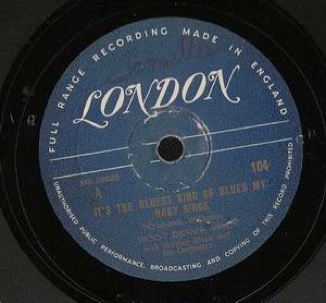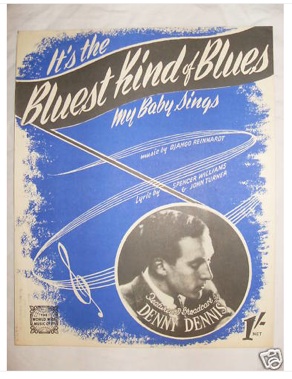It’s The Bluest Kind of Blues
For every vocalist a song will come along that they will make uniquely their own. Everything gels, the vocals, the arrangements, the recording. It does not always follow that the song will be a hit, but it still retains that magical quality.
This was the case with the song, ‘It's The Bluest Kind Of Blues (My Baby Sings)’. It was one of many fine recordings that Denny made with Stanley Black and his Orchestra and it was recorded in September 1946. A lush arrangement, and featuring a fine solo on alto saxophone by Joe Crossman, the record evokes a late night atmospheric and bluesy feel, and Denny’s vocals soar above it in perfect harmony and control. This is the real Denny Dennis; and there is no suggestion of a Crosby imitator here. ‘It's The Bluest Kind Of Blues’ is Denny’s song and in the Denny Dennis style.
The recording of ‘It's The Bluest Kind Of Blues’ was based on the Django Reinhardt tune, ‘Nuages’. Spencer Williams, of ‘Basin Street Blues’ fame, had put a very simple set of lyrics to the tune. Certainly the lyrics are simplistic, and hardly rank amongst the greats. But Denny recognised something in the tune when he heard it, and he wanted to record it.
“They were all going for this ‘It's The Bluest Kind Of Blues’ record, (in the United States) which incidentally, in the first place, Decca hadn’t wanted me to record. I actually really did like the song, it appealed to me.
On a personal note, there is I feel another reason for the success of the recording. Although Denny is perhaps the ‘archetypal’ English dance band vocalist, he had a rare musical quality I feel that many British vocalists of the period did not fully share. Denny seemed to understand and have a feeling for the ‘Blues’. Other recordings by Denny bear out my suggestion, especially the 1948 recording of ‘I’m Feeling Low’, featuring Stanley Black on the piano.
The recording of ‘It's The Bluest Kind Of Blues’ was to prove a milestone for Denny and his career. It was not a hit in Britain, but it proved very popular in the United States with key people who knew real talent when they heard it. Duke Ellington played it on his radio show several times a day, and when Tommy Dorsey heard it, he was more than impressed with Denny's performance. Originally, the title was not one of the selected titles for release on the Decca / London label in the States, but somehow it ‘mysteriously’ got through.
As a result, Decca discovered that Denny was no longer under contract to them, and then provided Denny with all the publicity that he required, plus a rise in royalties, and a new contract. Denny was then back in the studios, recording a great many numbers, with the finest arrangements provided by the Stanley Black and Robert Farnon Orchestras.
The reason for this rush of recordings was that Denny began to receive more American offers, and when the offer from Tommy Dorsey came, Denny decided to accept it. He would be following in the footsteps of previous ‘Dorsey’ vocalists, including Frank Sinatra and Dick Haymes. In March 1948 he left Britain to become the featured vocalist with Tommy Dorsey Orchestra. By the standards of the day, how important was this? To put it in modern parlance, it would be akin to becoming a replacement ‘Beatle’, at the height of ‘Beatle Mania’.
A 1948 report in the ‘Melody stated that:
“Next Tuesday, a famous British vocalist leaves for the United states to embark on a new career in the most exciting and star - studded company that it is possible for the imagination of any singer to envisage. The lucky vocalist is our own Denny Dennis who gets the biggest break of his career by joining the Tommy Dorsey Orchestra. It has been well known that for some time the Americans have been keenly interested in Denny. His ‘London’ records of such numbers as ‘It's The Bluest Kind Of Blues’, ‘But Beautiful’ and ‘Honey’ have caused a sensation in the States”.
The new Decca recording contract meant that Denny would remain under contract to Decca until 1950, but he would also be allowed to make recordings in the United States.
Denny’s Story

